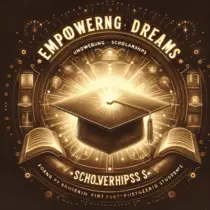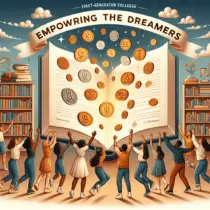Introduction
Education is not only a pathway to personal and intellectual growth, but it also opens doors to a better future. However, for many first-generation students, pursuing higher education can seem like an unattainable dream due to financial constraints. Fortunately, there are numerous scholarships and financial aid opportunities available specifically tailored to support these pioneering individuals in their academic journeys. This article aims to shed light on the importance of empowering first-generation students and unveil various scholarships that can propel their dreams forward.
By breaking down the financial barrier that often hinders first-generation students from accessing quality education, scholarships provide them with a chance to pursue their passions and contribute to society in meaningful ways. These scholarships not only provide financial aid but also offer mentorship programs, networking opportunities, and access to resources that help students succeed both academically and personally.
Scholarship Programs for First-Generation Students
1. The Gates Scholarship:
The Gates Scholarship is one of the most prestigious scholarships available for first-generation students. Founded by Bill and Melinda Gates, this scholarship covers the full cost of undergraduate education at an accredited college or university of the student’s choice. In addition to financial support, recipients of The Gates Scholarship are provided with mentorship and leadership development programs.
2. The Dell Scholars Program:
The Dell Scholars Program offers support and resources to high school seniors who have overcome significant personal challenges while pursuing their education. Recipients of this scholarship receive $20,000 for their college education, as well as a laptop and ongoing mentorship to ensure their academic success.
3. The Dream.US Scholarship:
The Dream.US Scholarship is specifically designed for immigrant students who came to the United States as children. This scholarship offers up to $29,000 in financial aid for students to pursue an associate’s or bachelor’s degree at one of their partner colleges or universities. The Dream.US Scholarship also provides scholars with access to career development opportunities and internships.
Benefits of Scholarships for First-Generation Students
1. Financial Support:
Scholarships alleviate the financial burden associated with college tuition, allowing first-generation students to focus on their studies without the added stress of loans and debt. This support enables them to fully immerse themselves in their educational journey and make the most of the opportunities presented to them.
2. Mentorship and Guidance:
Many scholarship programs offer mentorship and guidance, connecting first-generation students with experienced individuals who can provide valuable advice and support throughout their academic journey. These mentors often become strong pillars of encouragement and provide insights into navigating higher education successfully.
3. Networking Opportunities:
Scholarships often come with networking opportunities that allow first-generation students to connect with professionals and peers who share similar aspirations. Networking opens doors to internships, job opportunities, and a broader support system within various industries, setting them up for a successful career path after graduation.
Frequently Asked Questions (FAQ)
Q: Are scholarships only available for high-achieving students?
A: No, scholarships are available for students with various academic abilities. There are scholarships that consider financial need, extracurricular involvement, leadership potential, and other unique factors. It is important to explore different scholarship opportunities and find the ones that align with your specific strengths and circumstances.
Q: Can first-generation students apply for multiple scholarships?
A: Absolutely! First-generation students should take advantage of all the scholarship opportunities available to them. Applying for multiple scholarships increases the chances of receiving financial aid and provides more options in terms of choosing the right educational institution.
Q: How can first-generation students find suitable scholarships?
A: There are numerous resources available for finding suitable scholarships. Research online platforms, such as scholarship search engines and websites dedicated to assisting first-generation students. Additionally, reach out to your high school counselor or contact local community organizations that may have information on relevant scholarship opportunities.






